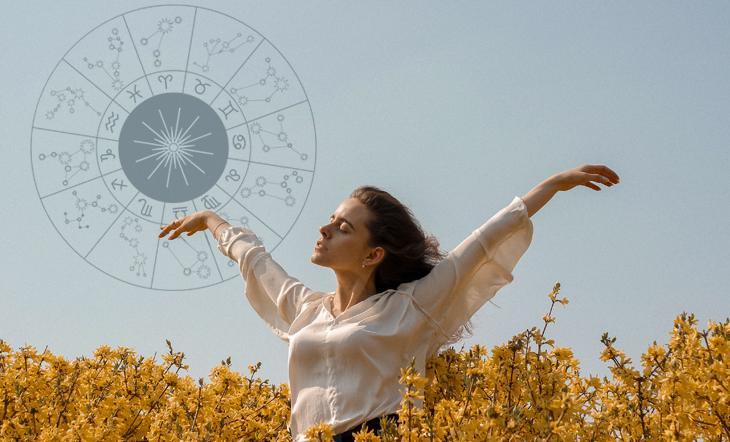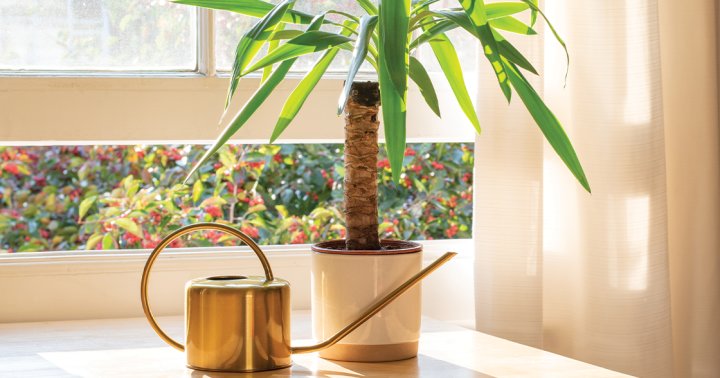Enlightenment Is Broadway
Stripping away the ritual and finding Zen at the checkout line The post Enlightenment Is Broadway appeared first on Tricycle: The Buddhist Review.

Stripping away the ritual and finding Zen at the checkout line
By Matthias Esho Birk Feb 13, 2024 Photo by Zeke Goodyear
Photo by Zeke Goodyear“You’re too in love with Zen,” she said. I sensed she was getting annoyed with me. “What an odd thing to say,” I thought (but did not say—I, instead, probably just looked confused). After all, we were sitting in a Zen meditation center, in a small room outfitted with a Buddha statue, a proper altar, and she was my Zen teacher. Too in love with Zen?
Of course I was in love with Zen. I had been practicing Zen since I was a teenager, sometimes saying that Zen saved my life, and was a serious and committed Zen student. Why would I not be in love with Zen? Wasn’t that the whole point? Until then I had always thought of my love of Zen as a good thing. Something that helped propel and motivate my practice. And yes, I loved (almost) everything about it: the Japanese aesthetics, the seriousness, the—at times—almost grim demeanor of Zen, the toughness of long sittings and days-long silence, the elite feeling of doing something that most people would never dream of doing. I remember one of my earliest Zen teachers saying, “there are many ways to enlightenment, but Zen practice is the most direct, the steepest path.” I had felt a sense of pride about that, a specialness. I was going direct. Zen, I thought, was the most important thing in my life. And here I was, scolded by my own Zen teacher that I was too in love.
There is a famous Zen koan that goes: A monk asked the great Zen master Joshu in all earnestness, “I have just entered this monastery. I beg you, Master, teach me.” Joshu asked, “Have you eaten your rice?” The monk answered, “Yes.” And Joshu said, “Go, wash your bowl.” At first sight, this interaction seemed quirky. It seemed to have a certain Zen mystique to it. What is it about the rice, the bowl? What is the hidden teaching, the hidden meaning of Master Joshu’s teaching? We come to Zen (or any other spiritual practice, for that matter) with all our pain. Our confusion, our problems, our lostness. Maybe life hasn’t worked out the way we thought it would, or maybe it has and we still don’t feel happy or at peace. Maybe we spend a lot of time feeling anxious about an unpredictable future, or simply have had a hard time dealing with the existential fact that we all need to die. Or maybe we simply cannot seem to make sense of it all. Whatever the motivation, we come to Zen practice to find something that is not this: confusion, pain, lostness, fear. Somewhere, we think, there must be something else. A magic elixir that finally gives us peace. We are not sure we know what it is, but we sense that Zen might be able to give it to us. “I beg you, Master, teach me. Take away my misery and replace it with something else: serenity, peace, enlightenment.” We are up for a great trade. The trade of a lifetime—one that sets us free. That is what the monk is asking for: “teach me.” And what does Joshu teach him? To wash his rice bowl. How is that supposed to liberate the student?
Let’s understand Joshu’s monk as ourselves for a moment: we come to the monastery, pleading with Joshu to show us how to be free. What does he point us to? “Freedom is right here—all you need to do is let go of your belief that it ever is anywhere else.” There is nothing magical about the rice bowl. It simply is the thing right in front of the student, right now. If alive today, he might have said, “finish that email,” or “park the car.” In Brazilian novelist Paulo Coelho’s book The Alchemist, a shepherd goes on a long adventure to find a treasure, only to return to the same tree he used to shepherd under and realize that the treasure he had been looking for was right underneath the very tree he started from. Zen practice can be like that. Our pain and struggle motivates us to look for salvation outside of ourselves. Maybe we are inspired by images of seemingly serene Zen masters. We come to a Zen center to practice, maybe fall in love with the rituals, the robes, the brush paintings. It all seems so foreign and so magical. In any case, it all seems very special. And that specialness, that love for Zen—the rituals, the imagery, the aesthetics—can help us and motivate us to come and practice.
In fact, it may be that this love for Zen is a necessary step. How else would we be willing to endure the pain of long hours of meditation away from friends, family, and the distractions of our own relentlessly thinking mind? But it also is a barrier. What happens when we make our practice special? We create a duality. Zen, we start to think, is something that happens at the Zen center. On a Zen cushion. With an incense stick burning on the altar. But what is Zen at its core? It is stilling our thinking mind and fully awakening to this boundless moment, vast and ever-present. Suzuki Roshi, when asked to reduce Zen to a single phrase, simply answered “everything changes.” Zen is nothing special. And it has nothing to do with a Zen center, robes, rituals, or Buddha statues. All of that is simply an expression. What becomes possible when we free Zen from the forms we have identified it with? The boundaries we draw around it? Everything can become Zen. Everywhere. All at once. Each and every moment is an opportunity to awaken: the walk to the subway, standing in line at the grocery store, typing an email, doing our taxes (yes, even our taxes). Once we start to see it that way, our practice can become boundless.
What happens when we make our practice special? We create a duality.
But, of course, practicing in the checkout line can be more demanding than practicing in a meditation hall. There are seemingly endless potential distractions: “Did I forget something? Sugar-free chocolate, that can’t be good! How come my line is moving more slowly than the other three lines?” And most of the time, we simply give in to the temptations of letting the mind go on and on about this and that. But we can practice being completely still even in this situation: Allowing our mind to rest on the in-and-out breath. Detaching again and again from the mind’s attachment to yet another thought.
The great jazz musician Miles Davis once said, “I always listen to what I can leave out.” For those of us in love with our practice, that can be the biggest challenge. Letting go of our notion of practice so completely, that no practice is left. Just life as it is. Now. Zen practice is nothing special. It’s just sitting and breathing. Nothing special about walking meditation. It’s just walking and paying attention. It’s not extra—it is our life. Ordinary, normal, just this. Any extras we add on are just that—extra. Subtract the spiritual, even subtract the practice. It becomes simple. What remains of your spiritual practice when you take everything away: robes, rituals, the Buddha, even the name Zen. Where is Zen then? Is it still here? What happens when you let your practice become so pure, so simple, that not one thing remains?
“Enlightenment will happen on Broadway,” she said right after scolding me for being too in love with Zen (the zendo we were sitting in was—and still is—just blocks away from Broadway). What she meant was this: not in a monastery, not in an imagined future, not in an idealized place. Enlightenment is never anything else than this. Right here. In that sense, we can make that sentence even simpler: “Enlightenment is Broadway,” is the taxes, is the supermarket, and the train ride. When we start to live that way, love still has a role to play—the lead role, in fact. But it shifts from being in love with (an imaginary idea of) Zen to being in love with this present moment as it unfolds.
After all, “you’re too in love with this present-moment reality as it unfolds,” no Zen master has ever said in the history of time, or ever will, for that matter.
![]()
Thank you for subscribing to Tricycle! As a nonprofit, we depend on readers like you to keep Buddhist teachings and practices widely available.
This article is only for Subscribers!
Subscribe now to read this article and get immediate access to everything else.
Already a subscriber? Log in.

 Troov
Troov 
































